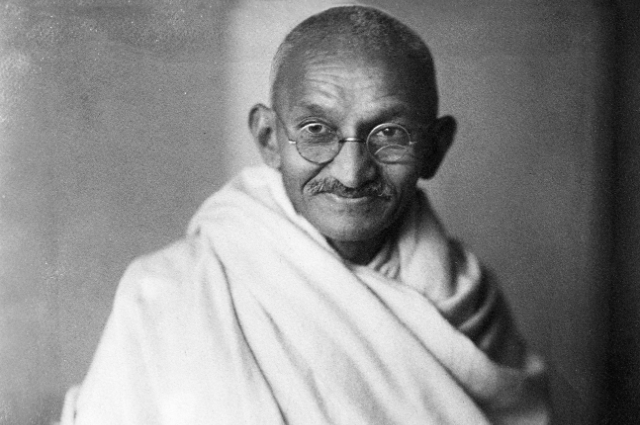Gandhi is widely associated with famous marches, and quite recently, he completed his longest one yet- from the saintly everyman of history textbooks to the whimpering minority appeaser of social media. Neither one confers to the dreadfully honest, often confused, often decisive man as laid bare in his autobiography. And the campaign to discredit Gandhi rings true with claims ranging from false- such as his role in the partition, to abstract- such as his preference for Jawaharlal Nehru. Amidst this storm of accusations, Gandhi is quite often acquitted of one of the more potent charges against him- that Gandhi wasn’t serious about independence. Or rather, about political independence from the British. It being largely missing in public discourse means a crucial part of Gandhi’s ideology is hidden. The charge is not exactly true, but it does lie in the right direction.
Bhagat Singh and Subhash Chandra Bose almost completely represent the independence movement beyond that advocated by Gandhi, and the points of contention were mainly two- the methods, and the goal. That non-violence was the difference between Gandhi and Bose is well known, but there was a significant rift in their purpose as well. While the common goal was to form a fully functioning Indian government, Gandhi’s was more to secure personal independence. And in this quest, self-rule was only one aspect of it. After his first interview with Gandhi in 1921, Bose perceived Gandhi as being vague about his goals.1 This apparent vagueness in Gandhi stemmed from his attempts to approach freedom from a personal level, and not a directly political one. Many of Gandhi’s initial mobilisations, such as those in 1916 and 1917, revealed Gandhi’s deeper allusion to the inherent problems of the people, often not his own, without attempting to appropriate their support for the national movement. While working for localised causes, however, he employed simple ideals- integral honesty, genuine goodwill and basic dignity. And so laid the foundation for the citizen who could recognize their individuality beyond their identity. This contributed to building Gandhi’s reach across caste, religion and even gender. It was, as such, a different front with which Gandhi dealt, from the front of political independence.
Gandhi’s inability to theoretically single out the excesses of the British empire in the first place, and subsequent realization of it may be explained from his two deeply expressed principles- devotion to truth and devotion to his parents. In his autobiography, Gandhi writes, “One of the pictures I was shown was of Shravana carrying, by means of slings fitted for his shoulders, his blind parents on a pilgrimage. The book and the picture left an indelible impression on my mind.”2 The paradox Gandhi often faced was having to oppose his parents in his attachment to truth, or what he considered right. Analogously, his often irrational attachment to societal values came to conflict with his observed ideals. By the evidence of his autobiography, Gandhi deeply respected his orthodoxy without understanding it, and therefore did not actively tackle any social disorders, until directly exposed to them. The more Gandhi’s exposure to the world increased, the more he began to challenge orthodoxy, and often reluctantly. A strong advocate for this point is Gandhi’s dealings with the Dalit problem. He was distressed by the treatment meted out to the untouchables, but his solution was to humanize and gain respect for the professions imposed on the lower castes (also because of an obsession with cleanliness, it seems). In doing so, he attacked the stigma surrounding such professions, but invited criticisms as his actions were more in line with healing the caste system rather than ending it, especially from Dr. Ambedkar. This despite the extensive efforts of both for the upliftment of Dalits.
Eventually Gandhi did acknowledge the necessity of complete independence, but having arrived at it through the lens of isolated issues, instead of direct theoretical exertion. Thus his loftier goal always remained to create the empowered citizen in any government, while that of others was to exert this empowerment through an indigenous government. Some credit may be attached to Gandhi’s reasoning, as evidenced by the inability of seventy years of self-rule to bridge many of India’s fault lines. This is not to question Indian democracy, but only to establish that without personal freedom, home rule is ineffective. Furthermore, Gandhi’s movement led to a people exerting on the government, quite inverse to the current arrangement. So, was Gandhi completely dissociated from independence? No, but it would be insipid to confine his ideology to just the independence of 1947. There were some greater dreams to achieve. Not of a perfect society, but a strong citizen.
. . .
References:
- Gordon, Leonard A. (1990), Brothers against the Raj: a biography of Indian nationalists Sarat and Subhas Chandra Bose, Columbia University Press, ISBN 978-0-231-07442-1
- Gandhi, Mahadev H. Desai (1929), Mohandas K. Gandhi, an Autobiography: The Story of My Experiments with Truth, Future Publishers and Distributors, Kolkata, ISBN 978-9-381-68820-5

